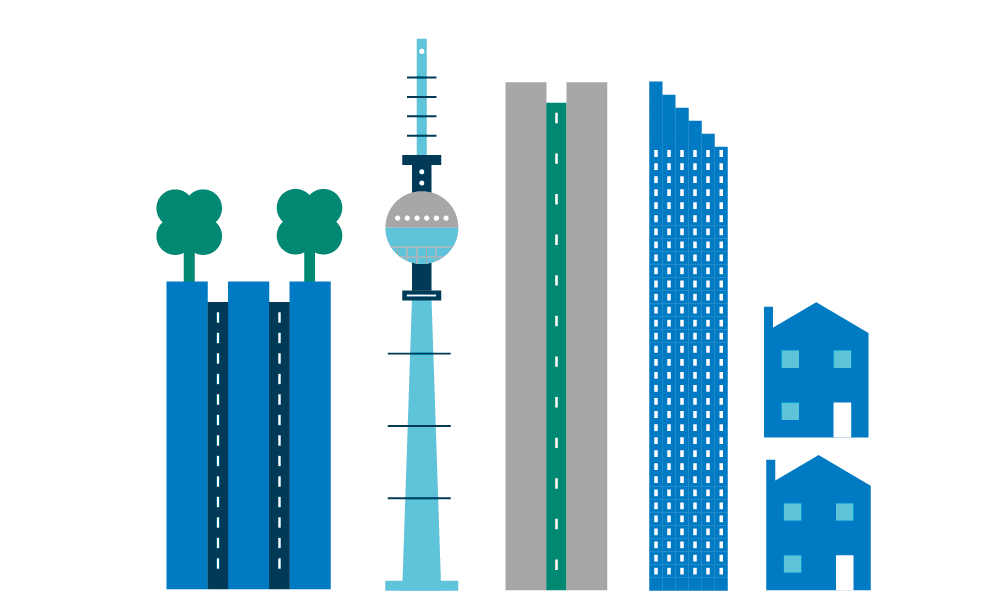International Disputes Overview
Dispute boards have become increasingly popular on international projects to assist parties to prospectively resolve potential disputes in a collaborative manner. Many organisations have now published dispute board rules, either as stand-alone rules or as part of the standard form contracts’ dispute resolution clause. These boards often provide a quicker a cheaper alternative to arbitration or litigation. However, to date, there has been little uptake in the UK, principally due to the already established and well utilised statutory adjudication regime under the Housing Grants, Construction and Regeneration Act 1996 (known as the Construction Act).
As the Dispute Adjudication Board (DAB) will usually be appointed at the start of the project and will provide guidance to the parties throughout the lifecycle of the project, it will have intrinsic knowledge of the project. This will help the DAB to make informed decisions.
FIDIC DAB/DAAB
Several of the FIDIC contracts provide for a Dispute Adjudication Board (DAB) or Dispute Adjudication/Avoidance Board (DAAB).
Under the 1999 ed. clause 20:
- Disputes are adjudicated by a DAB, which is jointly appointed by the parties within 28 days of a party notifying an intention to refer a dispute.
- Disputes are referred in writing to the DAB and the decision is to be given by the DAB within 84 days of the reference of the dispute (unless otherwise agreed).
- The decision is binding unless revised by settlement or arbitral award.
- A notice of dissatisfaction has to be given within 28 days in order to commence arbitration.
Under the 2017 ed, clause 21:
- The DAAB is appointed at the outset of the contract.
- The parties can jointly request the DAAB to provide assistance and/or informally discuss and attempt to resolve any issue or disagreement. If the DAAB becomes aware of an issue it can also invite the Parties to make a joint request. Any advice is not binding on the parties or on the DAAB in any dispute resolution processes.
- As to any Disputes (as defined), decisions are to be given within 84 days of the reference of the dispute (unless otherwise agreed).
- The decision is binding unless revised by settlement or arbitral award.
- A notice of dissatisfaction (NOD) has to be given within 28 days in order to commence arbitration.
NEC DAB
NEC4 provides for a Dispute Avoidance Board under Option W3:
- The DAB visits the Site at intervals from the starting date to the defects date unless the Parties agree a visit is not necessary. The purpose of the visits is to enable the DAB to inspect the progress of the works and become aware of any potential issues. Additional visits can be made on request by the Parties.
- The DAB is to assist the Parties in resolving potential disputes before they become disputes.
- Potential disputes are referred to the DAB between two to four weeks after it has been notified to the other Party and the Project Manager.
- The DAB then visits Site and inspects the works and unless the Parties have resolved the issue before the end of the visit, provides a recommendation for resolving it.
- A party cannot refer a dispute to the tribunal unless it has first been referred to the DAB as a potential dispute.
JCT DAB
More recently, we have seen the introduction of the Joint Contracts Tribunal’s (JCT) Dispute Adjudication Board (DAB). It is a hybrid offering which combines a dispute board procedure with an adjudication function. It is intended to provide a proactive and collaborative forum to help parties avoid disputes on both domestical and international projects.
The process envisages that the DAB will either visit or meet with members of the project team every two months. The parties can ask for the DAB to provide three tiers of advice:
- an informal opinion which is advisory and not binding on the parties;
- a Recommendation, being a formal report issued by the DAB which is not binding on the parties; and
- a Decision, which is issued in writing by the DAB and is binding on all parties until finally determined by legal proceedings/arbitration/agreement.
Arbitration is a consensual dispute resolution process, which means that parties need to agree for their disputes to be resolved through arbitration: a party cannot unilaterally commence an arbitration. Typically arbitration agreements are included in the contract between the parties, but they can form the basis of separate stand-alone agreements.
The arbitration process is often confidential (subject to any related interim or post-award court proceedings) and arbitration disputes are typically heard by either a sole arbitrator or a panel of three arbitrators, known as the tribunal. In a tribunal of three arbitrations, each party usually nominates an arbitrator with a chair/president appointed jointly by the party-appointed arbitrators or by the arbitral institution.
When and how is it used in an international context?
Arbitration is favoured in the context of international disputes as its affords parties from different jurisdictions flexibility and neutrality over their dispute resolution procedure as opposed to one party needing to submit to the national courts of the other, which may be unattractive.
Arbitrations can be administered by specific arbitral institutions, such as the International Chamber of Commerce or ICC (based in Paris), London Court of International Arbitration or LCIA (based in London) or the Singapore International Arbitration Centre or SIAC (based in Singapore) or they can be ad-hoc (that is, not administered by an institution).
What are the key considerations when looking to use of arbitration?
Arbitrations are subject to a number of different laws and rules, which include:
- The governing law: the governing or substantive law is the law that is applies to the substantive issues in dispute. Typically this is the governing law of the contract that is in dispute.
- The law of the seat of the arbitration (the “seat” of an arbitration can be different to the venue that any physical hearing actually takes place in): the seat of the arbitration subjects the procedure of that arbitration to the local laws of the country of the seat. For example, an arbitration seated in Paris would be subject to French procedural law and the support of the French courts. This may be different to the governing law.
- Rules of procedure: the parties may agree that certain procedural rules will also govern their dispute. For example, arbitral institutions have procedural rules that the parties can incorporate into their arbitration agreements, such as ICC Rules 2021 or the LCIA Rules 2014. These rules are usually in addition to the law of the seat of the arbitration.
- The law of the arbitration agreement: issues as to the interpretation and validity of the arbitration agreement itself are subject to the law of the arbitration agreement. In many jurisdictions, arbitration agreements are separable from any contract in which they are contained which means that the law of the arbitration agreement may be different to the governing law of the contract.
The enforcement of arbitral awards is governed by the New York Convention on the Recognition and Enforcement of Foreign Arbitral Awards 1958.
For more information on international arbitration, click here.
What are the pros and cons of resolving a dispute via litigation?
Although litigation has its drawbacks (namely the length of time it can take for a decision to be reached, and the high costs associated with these extended timings), dispute resolution through the traditional route of the courts has many important advantages.
- There is a right of appeal (though a party needs to have solid grounds for an appeal court to hear its case, such as if a serious mistake was made by the judge in the court of first instance, or there was a procedural irregularity during the trial). A party cannot appeal a case solely on the grounds that it doesn’t like the outcome of the dispute.
- Another consideration is that there are strict rules on evidence and disclosure which provide some certainty to the parties in respect of the conduct of the proceedings. This is compared with arbitration, which generally has more flexibility built in, giving the arbitrators a wider discretion in respect of procedural matters such as evidence and document production, which can be dependent on the procedural rules of the arbitration.
- Further, the non-consensual nature of litigation (as opposed to arbitration) can prove attractive to claimants. This is particularly of note where the relationship between the parties has broken down. The claiming party does not have to rely on the co-operation of the counter-party; the parties are instead required to follow the rules, directions and orders of the court, which prescribes the process and steps to be taken by the parties leading up to any trial. If a party does not comply with the court’s requirements, sanctions may follow, including a party’s claim/defence being struck out.
Should I consider litigation in the English courts for a dispute concerning an international project?
Clearly litigation has its place in construction disputes, but what about on international projects? Again, while the costs of bringing an international claim in the English can be high, and the lack of procedural flexibility brings with it some practical challenges, litigation in the English courts may remain an attractive option.
London has been a traditional centre for international commercial litigation largely on account of the prevalence of English law and the status of English as the dominant language of international business. The high calibre of the English judiciary and the existence of a specialist construction court in the Technology and Construction Court can, however, give the English courts an advantage over many other jurisdictions.
What is mediation?
Mediation is a voluntary, confidential, informal, flexible, relatively speedy and inexpensive process in which a trained independent facilitator, the mediator, will help the parties settle their disputes by focusing on the parties’ interests.
In most disputes it is in the parties’ interests to settle, rather than to spend time, cost and effort in fighting each other in formal, sometimes public, court or other proceedings.
How does a mediation work?
Mediation, and settlement or otherwise at or after the mediation, is in the total control of the parties. Unlike a judge or an arbitrator, a mediator does not judge or decide anything in favour of a party. It is entirely up to the parties whether they settle and, if so, on what terms.
A mediation can take place at any time. What is the best time for any dispute will depend on a number of factors, including the extent to which each party has exchanged information about the nature of and evidence for its case. The timing should always be kept under review as circumstances change.
Some contracts require the parties to mediate as part of a tiered dispute resolution procedure. The courts in some jurisdictions require the parties to a dispute to consider mediation prior to, or during, formal court proceedings
How does adjudication work in the UK?
In the UK, parties to a construction contract have the legal right to refer a dispute to adjudication “at any time”. This is known as statutory adjudication as the right, which cannot be contracted out of, arises from the Housing Grants, Construction and Regeneration Act 1996 (as amended), otherwise known as the Construction Act.
Adjudication was introduced in the UK to improve cash flow in the construction industry and to ensure that there was quick and cheap way to resolve construction disputes.
Adjudications are decided by adjudicators, who are either agreed by the parties or nominated by an adjudicator nominating body. Decisions are issued within 28 days of referral of the dispute to the adjudicator (although this period can be extended) and disputes are usually decided on paper without a hearing.
There are limited grounds on which to challenge an adjudication decision and the UK courts have developed a specific process for the prompt enforcement of adjudication decisions.
Is adjudication used in other jurisdictions?
Other countries across the globe have followed suit. Statutory adjudication can now be found in Malaysia, Australia, Singapore, New Zealand, Canada and Ireland, although the range of disputes that can be referred to be resolved by adjudication differs across jurisdictions. For example, in some of these countries only payment disputes can be referred to adjudication but in others, including the UK, a broader range of disputes can be referred, including technical disputes and disputes on contractual interpretation.
In jurisdictions where no statutory adjudication regime applies, parties can nevertheless agree to resolve their disputes, or certain of them, by adjudication by providing for adjudication as a dispute resolution process in their contracts. This is known as contractual adjudication. The parties are free to agree how the adjudication process will run, for example, the appointment of the adjudicator, number of submissions and the deadline for the issue of the decision.
What is an expert determination?
Expert determination is a form of alternative dispute resolution whereby the parties agree to submit a dispute to an “expert” who will make a decision on the matter referred to her/him. Parties can agree to use this process if and when a dispute arises or stipulate for its use in their contracts.
The parties should agree and record whether the expert determination is to be binding or non-binding on them. If the decision is to be binding on the parties, they should also consider if and how that can be overturned, for example, by referring the matter to litigation or arbitration.
What does it involve and what are the key considerations?
As expert determination is essentially a form of alternative dispute resolution agreed between the parties: the process itself is agreed between them. This flexibility and tailored approach to the process may be helpful.
The parties will want to consider, among other things, the following issues:
- If the expert’s decision is binding on the parties. Parties sometimes decide for the expert to give a non-binding opinion. If the parties want the ability to open up, review and challenge the decision then it is best to expressly agree and record this.
- The selection of the expert. The parties will want to ensure the expert is independent and possesses the expertise and technical knowledge relevant to the dispute. If the parties cannot agree on an expert they may want to use an appointing body to appoint an expert based on an agreed criteria.
- The scope of the expert’s powers and duties. This will typically be set out in “terms of reference” to the expert.
- The number and timings of submissions to the expert.
- Whether a site inspection or other meeting is required.
- How fees and costs will be dealt with. For example, the parties may agree to bear their own costs but give the expert the power to decide who pay her/his fees.
The parties will want to ensure that the agreement on these matters are binding on the parties. This can be done in the original contract or by a separate supplementary agreement.
When to use it?
Expert determination can be a very effective form of dispute resolution for certain matters. Its advantages include:
- The parties can agree/select an expert who is known to be a specialist in a particular area. This may assist where disputes relate to technical issues or matters of quantum.
- The process is informal and flexible and can be adapted to the circumstances of the dispute.
- It is typically a cheaper and quicker option to litigation or arbitration.
- It may avoid the need for the parties to appoint their own experts on technical issues as these can be dealt with by the expert.
- It is a private and confidential process, unlike most court proceedings.
- The expert can adopt a more investigative approach and may be more “hands-on” than a court or tribunal. This may be particularly relevant to disputes regarding technical issues.
What are the risks?
It is generally not suitable for complex disputes involving disputed factual evidence. There may also be disputed areas of law or other technical issues that an expert would not be in a position to opine on. Therefore, expert determination often works better when the matter referred is discrete or can be dealt with independently of disputed matters of fact or law.
The parties should also consider the skillset of their expert and whether they have sufficient experience of acting in that capacity. A decision which is not clearly explained or poorly reasoned may lead to further disputes. Equally, the parties will be keen to ensure that the expert does not overstep her/his jurisdiction and properly utilises her/his powers and duties. Not only will this be likely to lead to a more satisfactory decision but it will also avoid disputes as to whether the decision is enforceable or not (if it is binding).
The expert determination process is primarily based on the agreement of the parties and so the contractual provisions dictating this (or a later supplementary agreement) will be critical if the parties want to build in this method of ADR into their contracts. It is therefore important for the parties to take legal advice as to its content.
“These materials are written and provided for general information purposes only. They are not intended and should not be used as a substitute for taking legal advice. Specific legal advice should be taken before acting on any of the topics covered.
Osborne Clarke is the business name for an international legal practice and its associated businesses. Full details here >
© Osborne Clarke LLP”







